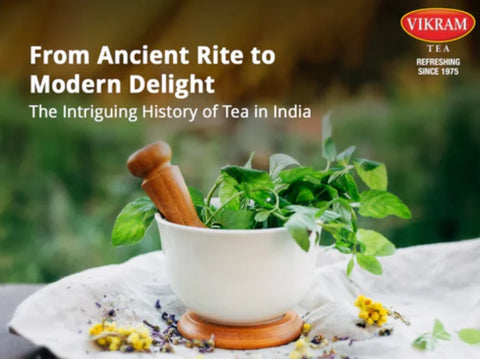Imagine endless emerald-green tea gardens, misty mornings with a scent of fresh leaves in the air, and the thunderous Brahmaputra River flowing through it all. Welcome to Assam— a land where nature, culture, and the world's finest black tea meet in perfect blend. Assam is not merely a region, but it is a complete experience to catch all your senses, with tea being the star.
But how did Assam become synonymous with black tea, and what makes this region’s tea so special? Let us begin this journey to discover this great tea heritage, its relation to the Brahmaputra, and how every cup of Assam tea is like sipping the essence of nature itself.
A Region Shaped by the Brahmaputra
The story of Assam begins with the Brahmaputra, one of the biggest rivers in the world. This great river cuts across Assam from its source in the Himalayas in Tibet to infuse the land it passes through with life and provide nourishment. The fertile soil of Assam, set up by the silt from the Brahmaputra, is one of the key reasons why this region is perfect for growing tea.
From the geographical point of view, the river is the lifeline of Assam. Flowing majestically across this region, it has automatically influenced the culture, way of life, and economy of the state for centuries. Every year, the Brahmaputra floods the plains, spreading nutrient-rich soil to develop it into a perfect place for tea cultivation. It's this unique combination of geography and climate that makes Assam one of the largest tea-producing regions in the world.
Discovery of the Tea Treasure of Assam
Tea was a mystery that most of India knew little to nothing about. After all, tea had been sipped in China and only the elite could get their hands on it in Europe. All this changed in the 1820s when Robert Bruce, a Scottish adventurer, was trekking through the jungles of Assam and he chanced upon wild tea plants brewed by the local Singpho tribes into an elixir.
This discovery by Bruce led to the development of today's largest tea industry worldwide. The British East India Company took the opportunity and started planting tea saplings on a large scale to establish the very first tea plantations in Assam in the 1830s. The mid-19th century saw Assam tea exported to nearly all parts of the world, thereby establishing the reputation of Assam for a stout, strong black tea.
What makes Assam tea so special?
Now, let's talk about the star of the show- Assam black tea. When you are talking of black tea, you probably imagine a strong, malty brew that packs a punch. And that’s what Assam tea is known for, the strongest black tea. Its bold flavour, deep colour, and rich aroma make it one of the most sought-after teas worldwide. So, what exactly gives Assam tea its distinctive taste?
It all comes down to Assam’s unique terrain— a combination of geography, climate, and soil that influences the flavor of the tea. Assam is a place of low latitudes and has an extremely warm, humid climate with considerable rainfall during the right seasons for tea cultivation. The crops here are easily grown in the fertile alluvial soil deposited by the Brahmaputra River, absorbing the nutrients that give Assam tea its characteristic strength and richness.
Assam leaves usually are larger than the majority of varieties and are picked twice in a season referred to as "first flush" and "second flush". It is the "second flush" typically in late summer, which is also liked for its golden-tipped leaves and malty flavour.
The art of making Assam Tea
Brewing the perfect Assam tea is an art perfected over generations of grooming. Tea gardens are often referred to as "estates," which sprawl across massive areas. Imagine rows and rows of tea bushes immaculately pruned and tended by master hands that know the plants like their own palms.
Not just workplaces, tea gardens in Assam are almost a community in themselves. Most tea estates have their own school, hospital, and other types of accommodation for workers; thus, people dedicate most of their lives to these centres and feel a sense of belonging while here.
Tea leaves are plucked in an extremely delicate manner requiring speed and precision. Only the tender top two leaves with a bud are picked from the tea plant because they are the most flavorful of all. This laborious process is of great significance for the best quality of the celebrated Assam tea.
A Global Sensation: From Assam to the World
Way beyond the Indian borders, Assam tea travels internationally and finds its natural place in the teapots spread across the globe. Be it on the breakfast tables of England or the Russian teahouses, Assam tea is a global favourite. With such strength and a rich, malty flavour, it makes the perfect choice for brewing a cup of traditional English Breakfast tea or the classic Indian masala chai.
Perhaps its greatest virtue is that it goes well even with milk and sugar; but it is, of course, at its best when served black. It can be said that Assam's second flush teas are among the most prized for their depth and complexity when it comes to tea connoisseurs.
The Connection Between Assam Tea and Chai Culture
Everywhere in India, tea stalls line up along streets, providing hot cups of spiced tea to millions of people every day. Strong, malty Assam tea gives a backbone to a good cup of chai: its flavor stands up beautifully against spices such as ginger, cardamom, and cinnamon.
Chai is a social ritual in India and it's far more than just a beverage. Whether catching up with friends at a roadside stall, taking a break from work, or even planning to get married, chai brings them together. And at the heart of every chai experience is Assam tea.
Future Prospects of Assam Tea: Challenges and Opportunities
While being the world's favorite, Assam tea faces some pretty big challenges in this industry. Issues such as climate change, market price unrest, and the general problem of labor have indeed been burdening the region's tea growers
Still, Assam tea does not lack its dose of resilience. Industry reforms are indeed on the cards to address issues of sustainability, worker welfare, and diversification whereas specialty teas like inorganic Assam and artisanal varieties among others are fast gaining popularity among health-conscious consumers and present new opportunities within the industry.
Tea Tourism: Live the Assam Tea Legacy
For a true tea connoisseur, Assam is the land where dreams are made. Tea tourism is one of the fast-growing industries today, with almost all estates throwing open their doors to visitors. Guests at the tea-tourism sites could visit the tea gardens, observe the plucking and processing of tea leaves and indulge in a tea-tasting session, besides enjoying a luxurious stay in colonial-era bungalows situated within the tea gardens.
A Cup of Assam: Way Beyond A Drink
Finally, Assam tea is more than a drink and it represents the land it comes from. It carries with it the strength of the Brahmaputra, the richness of the soil, and generations of care taken up by the tea growers. For each sip, what is consumed is not just tea, but the essence of Assam.
Hence, the next time you brew a cup of Assam black tea, take some time to appreciate this journey that extends from the lush Brahmaputra-nourished tea gardens to your teapot. This story is that of nature, culture, and above all, the perfect glass of tea, that is timeless.
How do you prefer your Assam tea—bold and black, or spiced and milky in a chai? Share your thoughts on this remarkable brew!




